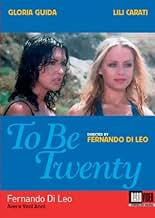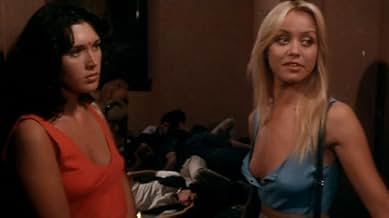CALIFICACIÓN DE IMDb
5.8/10
1.3 k
TU CALIFICACIÓN
Lia y Tina, buscando aventuras en Roma, terminan en situaciones peligrosas de prostitución y confrontación con la policía tras un plan que no sale como esperaban.Lia y Tina, buscando aventuras en Roma, terminan en situaciones peligrosas de prostitución y confrontación con la policía tras un plan que no sale como esperaban.Lia y Tina, buscando aventuras en Roma, terminan en situaciones peligrosas de prostitución y confrontación con la policía tras un plan que no sale como esperaban.
Carmelo Reale
- Head of rapists
- (as Roberto Reale)
Raul Lovecchio
- Vice-commissioner
- (as Raoul Lo Vecchio)
Salvatore Billa
- Delinquente in Bar
- (sin créditos)
Angelo Boscariol
- Cliente in trattoria
- (sin créditos)
Opiniones destacadas
I have seen a shortened cut of "Avere Vent'Anni" but now I've watched the full-length version twice and there's a lot more to this film than some people seem to think. Fun is poked at bourgeois society, at self-important males doing jobs they think are important (store detectives, police inspectors), at a rich lesbian, at transcendental meditation, in short at many facets of seventies' life in Italy. Even the two female leads come in for their share. The ending can be seen as having nothing to do with the story, but I think there's more to it: while the girls just flit through life taking nothing seriously except having a good time, lurking at almost every corner is the reality of corrupt policemen and unscrupulous gangsters - the nasty side of the real world ... and in the end that will be their downfall.
In his 1978 film "Avere vent'anni" (To Be Twenty), director Fernando Di Leo attempts to capture the essence of youth, rebellion, and the complexities of growing up during a tumultuous era in Italy. Starring Gloria Guida and Lili Carati as two young women embarking on a journey of self-discovery, the film offers an intriguing blend of drama, comedy, and social commentary. However, despite its promising premise and some noteworthy performances, the movie ultimately falls short of delivering a truly memorable experience.
The film follows Lia (Gloria Guida) and Tina (Lili Carati) as they escape their restrictive lives in search of freedom and adventure. Their journey takes them from the countryside to the bustling city, where they encounter a variety of characters and situations that challenge their beliefs and force them to confront their own naivety. As they navigate their way through this new world, they must also grapple with issues such as sexuality, politics, and the ever-present threat of violence.
One of the film's strongest aspects is its depiction of the social and political climate of 1970s Italy. Di Leo does an excellent job of capturing the tension and unrest that permeated the country during this time, as well as the sense of disillusionment felt by many young people. The film's exploration of these themes adds a layer of depth and relevance that elevates it above a simple coming-of-age tale.
Another highlight of "Avere vent'anni" is the chemistry between Gloria Guida and Lili Carati. Their performances as Lia and Tina are both engaging and believable, effectively conveying the sense of excitement, confusion, and trepidation that comes with being on the cusp of adulthood. The bond between their characters is palpable, and their friendship serves as the emotional core of the film.
However, despite these strengths, "Avere vent'anni" suffers from a number of flaws that prevent it from reaching its full potential. One of the most glaring issues is the film's uneven tone, which oscillates between serious drama and slapstick comedy without ever finding a satisfying balance. This inconsistency can be jarring at times, and it often undermines the emotional impact of certain scenes.
Additionally, the movie's pacing can be sluggish, with some sequences feeling overly drawn out and others rushing through important plot points. This unevenness makes it difficult to fully invest in the story or the characters, and it contributes to a sense of disjointedness that permeates the film.
In conclusion, "Avere vent'anni" is a film with both commendable qualities and significant flaws. While its exploration of 1970s Italian society and the performances of Gloria Guida and Lili Carati are certainly noteworthy, the movie's uneven tone and pacing issues ultimately detract from its overall impact. Despite these shortcomings, however, the film remains an intriguing, if flawed, examination of youth, rebellion, and the search for identity during a tumultuous period in history.
The film follows Lia (Gloria Guida) and Tina (Lili Carati) as they escape their restrictive lives in search of freedom and adventure. Their journey takes them from the countryside to the bustling city, where they encounter a variety of characters and situations that challenge their beliefs and force them to confront their own naivety. As they navigate their way through this new world, they must also grapple with issues such as sexuality, politics, and the ever-present threat of violence.
One of the film's strongest aspects is its depiction of the social and political climate of 1970s Italy. Di Leo does an excellent job of capturing the tension and unrest that permeated the country during this time, as well as the sense of disillusionment felt by many young people. The film's exploration of these themes adds a layer of depth and relevance that elevates it above a simple coming-of-age tale.
Another highlight of "Avere vent'anni" is the chemistry between Gloria Guida and Lili Carati. Their performances as Lia and Tina are both engaging and believable, effectively conveying the sense of excitement, confusion, and trepidation that comes with being on the cusp of adulthood. The bond between their characters is palpable, and their friendship serves as the emotional core of the film.
However, despite these strengths, "Avere vent'anni" suffers from a number of flaws that prevent it from reaching its full potential. One of the most glaring issues is the film's uneven tone, which oscillates between serious drama and slapstick comedy without ever finding a satisfying balance. This inconsistency can be jarring at times, and it often undermines the emotional impact of certain scenes.
Additionally, the movie's pacing can be sluggish, with some sequences feeling overly drawn out and others rushing through important plot points. This unevenness makes it difficult to fully invest in the story or the characters, and it contributes to a sense of disjointedness that permeates the film.
In conclusion, "Avere vent'anni" is a film with both commendable qualities and significant flaws. While its exploration of 1970s Italian society and the performances of Gloria Guida and Lili Carati are certainly noteworthy, the movie's uneven tone and pacing issues ultimately detract from its overall impact. Despite these shortcomings, however, the film remains an intriguing, if flawed, examination of youth, rebellion, and the search for identity during a tumultuous period in history.
Hippie-exploitation movies aren't my cup of tea, but I honestly thought this was worth an exception based on the names involved. Fernando Di Leo is the writer/director of some of the most brutally violent and uncompromising Poliziotesschi movies, Ray Lovelock starred in many classics in that same sub-genre, and Gloria Guida and Lilli Carati, well... they're both just incredibly hot. Alas, though, even in this film all the annoying trademarks of hippie flicks are inevitable. I'm referring to a senseless plot, passive lead characters, unbelievable dumb weirdos in the supportive cast, copious amounts of pointless dancing footage, and a lot of hinting at sex-sequences that never come.
Beautiful brunette Tina and her even more beautiful blond friend Lia are - to put it in their own words - young, hot, and very angry with the world. They travel to Rome, where they join a sort of commune and get in all sorts of trouble. That's pretty much the only synopsis I can give. There's one very enjoyable sequence, namely when the brunette goes out to sell encyclopedias (yes, really!) and drives a university professor insane by making him believe she gets aroused from hearing the word "culture". Everything else is beyond pathetic, like a roommate dressed up as a meditating Pierrot (Leopoldo Mastelloni), and another lunatic who's dressed like "Where's Waldo?" (Vincenzo Crocciti).
"To Be Twenty" is somewhat notorious for featuring an extremely sick and misogynistic climax that totally doesn't fit the overall tone of the film. True, it's very sick, but it doesn't make the film any better or more interesting whatsoever. I also don't understand what Di Leo meant to say with this climax. Does he feel the girls get what they deserve? Is the moral of the story that women are the weaker sex? Or maybe simply that it's too dangerous for women to be traveling alone? All three options are loathsome, in fact.
Beautiful brunette Tina and her even more beautiful blond friend Lia are - to put it in their own words - young, hot, and very angry with the world. They travel to Rome, where they join a sort of commune and get in all sorts of trouble. That's pretty much the only synopsis I can give. There's one very enjoyable sequence, namely when the brunette goes out to sell encyclopedias (yes, really!) and drives a university professor insane by making him believe she gets aroused from hearing the word "culture". Everything else is beyond pathetic, like a roommate dressed up as a meditating Pierrot (Leopoldo Mastelloni), and another lunatic who's dressed like "Where's Waldo?" (Vincenzo Crocciti).
"To Be Twenty" is somewhat notorious for featuring an extremely sick and misogynistic climax that totally doesn't fit the overall tone of the film. True, it's very sick, but it doesn't make the film any better or more interesting whatsoever. I also don't understand what Di Leo meant to say with this climax. Does he feel the girls get what they deserve? Is the moral of the story that women are the weaker sex? Or maybe simply that it's too dangerous for women to be traveling alone? All three options are loathsome, in fact.
This movie is available in two versions. The English-language version is a badly-dubbed, waste-of-time sex comedy (not unlike a lot of the films co-lead Gloria Guida was starring in at the time). The Italian version is similarly light-hearted for much of its running time, but it does make some serious commentary on police corruption, the confused politics and ultimate hollowness of the 70's era counterculture, and the reactionary nature of male-dominated rural Italy. The ending is unforgettably brutal, inspired no doubt by films like "Last House on the Left" or "Late Night Trains". Like those films it was quite controversial, and really for the same ironic reason--because you really come to like the two lead characters and care what happens to them. This is no mean feat as Gloria Guida had no real acting talent beyond looking (really) good naked and the other lead, porno-starlet-to-be Lili Carati, was, if anything, even less talented.
The plot of the movie is rather loose and picaresque. It follows these two "beautiful and p***ed-off" girls as they hitchhike, shoplift, crash at a commune, dabble in prostitution, sell encyclopedias to lecherous university professors, get rousted by the police, and finally meet a tragic end at a roadhouse. Along the way the way they more than fulfill the sexploitation skin quotient and frequently throw themselves at various men who hilariously rebuff them (although despite the famed sexual aggressiveness of Italian men, it is not impossible to believe that they might react this way if the tables were suddenly turned on them). It is this free-spirited sexual aggressiveness that proves to be downfall of the two girls, but this movie is ultimately more touching and tragic than cautionary and moralistic--traditional, male-dominated Italian society certainly doesn't come off to well here.
The two versions have different discoesque musical arrangements that the characters do sexy, impromptu dances to--the Italian one is kind of catchy but the English-language is about as enjoyable as a barium enema. I would't bother with the English-language version, but the Italian version is definitely a worthwhile little movie.
The plot of the movie is rather loose and picaresque. It follows these two "beautiful and p***ed-off" girls as they hitchhike, shoplift, crash at a commune, dabble in prostitution, sell encyclopedias to lecherous university professors, get rousted by the police, and finally meet a tragic end at a roadhouse. Along the way the way they more than fulfill the sexploitation skin quotient and frequently throw themselves at various men who hilariously rebuff them (although despite the famed sexual aggressiveness of Italian men, it is not impossible to believe that they might react this way if the tables were suddenly turned on them). It is this free-spirited sexual aggressiveness that proves to be downfall of the two girls, but this movie is ultimately more touching and tragic than cautionary and moralistic--traditional, male-dominated Italian society certainly doesn't come off to well here.
The two versions have different discoesque musical arrangements that the characters do sexy, impromptu dances to--the Italian one is kind of catchy but the English-language is about as enjoyable as a barium enema. I would't bother with the English-language version, but the Italian version is definitely a worthwhile little movie.
Some time in the mid-70s, out-of-luck director Fernando di Leo had a million dollar idea: Why not do a remake of one of the top grossing blockbusters of 1969, with a slightly altered tagline: "Two chicks went looking for Italia and couldn't find it anywhere." And since those chicks would hitchhike across the country to join a hippie community, they didn't even need those pricey motorbikes! The Captain America role went to Euro teen star blonde Gloria Guida, the Billy part to the lesser-known Lilli Carati, a downright stunning brunette literally acting out every single word of her dialogue: I'm young, hot, and p*ssed off. Does anybody here f*ck?" A radically pessimistic statement from the bleak opening beach scene to the unforeseeable (and utterly disgusting) climax, Avere vent'anni bites off more than di Leo could chew: His counterculture swan song about two female libertines who inescapably will go to the dogs never finds a rhythm, a loose, sloppy concoction of scenes that don't blend, a programmatic reading from Valerie Solanas's SCUM manifesto (A pip-squeak with dysfunctional femininity that despises women: That is man.") remaining fairly more than a nod to the feminist zeitgeist in Fernando's T&A exploitation circus. Two stars for the boisterous performance of the lead actresses, reciprocating between vulnerability, sexual aggression, and pure, breathless joie de vivre, especially in the dance scene on the piazza; another one for Ray Lovelock's fine interpretation of a disenchanted druggie, and one and a half for the super catchy theme song. Ah, and as for Signorina Carati: Eat your heart out, Dennis Hopper.
¿Sabías que…?
- TriviaNamed #8 on the list of 10 Best Sexploitation Movies of All Time by website TheCinemaholic in 2017.
- Versiones alternativasThe movie was re-cut shortly after the Italian release. The 81-minute version omits the opening scene on the beach, the sequence featuring explicit lesbian sex between the two main characters, and the violent ending.
- Bandas sonorasAvere vent'anni
Written by Silvano Spadaccino (as Spadacino), Fernando Di Leo (as Di Leo)
Sung by Gloria Guida
Selecciones populares
Inicia sesión para calificar y agrega a la lista de videos para obtener recomendaciones personalizadas
- How long is To Be Twenty?Con tecnología de Alexa
Detalles
- Tiempo de ejecución1 hora 34 minutos
- Mezcla de sonido
- Relación de aspecto
- 1.85 : 1
Contribuir a esta página
Sugiere una edición o agrega el contenido que falta

Principales brechas de datos
By what name was Avere vent'anni (1978) officially released in India in English?
Responda



























